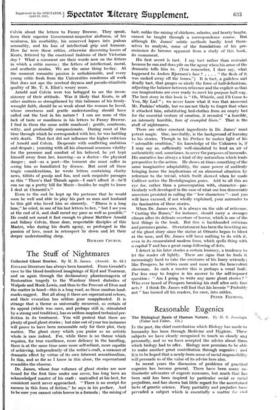The Stuff of Nightmares
Collected Ghost Stories. By M. R. James. (Arnold. 8s. 6d.) ENGLISH literature has always been haunted. From Grendel's cave to the blood-boultered imaginings of Kyd and Tourneur, and on again through the declamatory phantasmagoria of Restoration tragedy to the Wardour Street diabolics of Walpole and Monk Lewis, and thus to the Provost of Eton and the matter in hand—this is a long road, as these random land- marks suggest. But all along it there are supernatural echoes, and their evocation has seldom gone unapplauded. It is strange that a theme so universally recurrent, so certain of its appeal (which was once, and perhaps still is, stimulated by a strong oral tradition), has so seldom inspired technical per- fection in its treatment. You will protest that there are plenty of good ghost stories ; but nine out of your ten instances will prove to have been memorable only for their plot, their matter. The ghost story which you praise as an artistic whole is rare indeed. For, while there is no theme which requires, for true excellence, more delicacy in the handling, there is at the same time none more self-reliant, more capable of achieving, independently of the writer's craft, a measure of dramatic effect by virtue of its own inherent sensationalism. In this, and as far as I know in this alone, the supernatural resembles the obscene.
Dr. James, whose four volumes of ghost stories are now issued for the first time under one cover, has long been an acknowledged master of his craft : unrivalled at his best, for consistent merit never approached. " There is no receipt for success in this form of fiction," he says in his preface. And to be sure you cannot cabin horror in a formula ; the raising of -haft, unlike the raising of chickens, salaries, and hearty laughs, cannot be taught through a correspondence course. But although Dr. James' subtle methods hardly lend them- selves to analysis, some of the foundations of his pre- eminence do become apparent from a study of this book, its monument.
His first secret is tact. I say tact rather than restraint because he can and does pile on the agony when his sense of the dramatic tells him to. (You remember, I dare say, what
happened to Anders Bjornsen's face 9 " the flesh of it was sucked away off the bones.") It is tact, a guileless aid deadly tact, that gauges so nicely the force of half-definitions, adjusting the balance between reticence and the explicit so that our imaginations are ever ready to meet his purpose half-way. The best story in this book is " Oh, Whistle, and I'll Come to You, My Lad " ; we never know what it was that answered Mr. Parkins' whistle, but we are not likely to forget that when it attacked him, substituting bed-clothes from an empty bed for the essential vesture of creation, it revealed " a horrible, an intensely horrible, face of crumpled linen." That is the stuff of nightmares.
There are other constant ingredients in Dr. James' most
potent magic. One, inevitably, is the background of learning to his stories. Though in his Preface he makes light of his " ostensible erudition," his knowledge of the Unknown is, if I may say so, sufficiently well-simulated to lend an air of authenticity and, sometimes, to serve the purposes of innuendo. His narrative has always a kind of dry naturalism which lends perspective to the action. He shows at times something of the same imaginative adaptability, the same power of suddenly bringing home the implications of, an abnormal situation by reference to the trivial, which Swift showed when he made Gulliver notice the Brobdignagian pores. Add to all this an eye for, rather than a preoccupation with, character—par- ticularly well-developed in the case of what our less democratic ancestors persisted in calling the " low characters "—and you will have excused, if not wholly explained, your surrender to the fascination of these stories.
When Dr. James errs, it is always on the side of reticence.
" Casting the Runes," for instance, should carry a stronger climax after its delicate overture of horror, which is one of the best things in the book. But this is backhanded criticism and premises praise. - Overstatement has been the besetting sin of the ghost story since the statue at Otranto began to bleed at the nose, and Dr. James will have nothing to do with it, even in its emasculated modern form, which spells thing with a capital T and has a great camp-following of dots.
I detect in his later stories a certain leniency, a tendency to
let the reader off lightly. There are signs that he finds it increasingly hard to take the creatures of his fancy seriously; like Prospero, he retires more and more into the benevolent showman. In such a master this is perhaps a venal fault. Far less easy to forgive is his answer to-the self-imposed question : " Am I going to write any more ghost stories ? " Who ever heard of Prospero breaking his staff after only four acts ? I think Dr. James will find that his laconic " Probably not " has turned all his readers, for once, into critics.
PETER FLEMING.














































 Previous page
Previous page